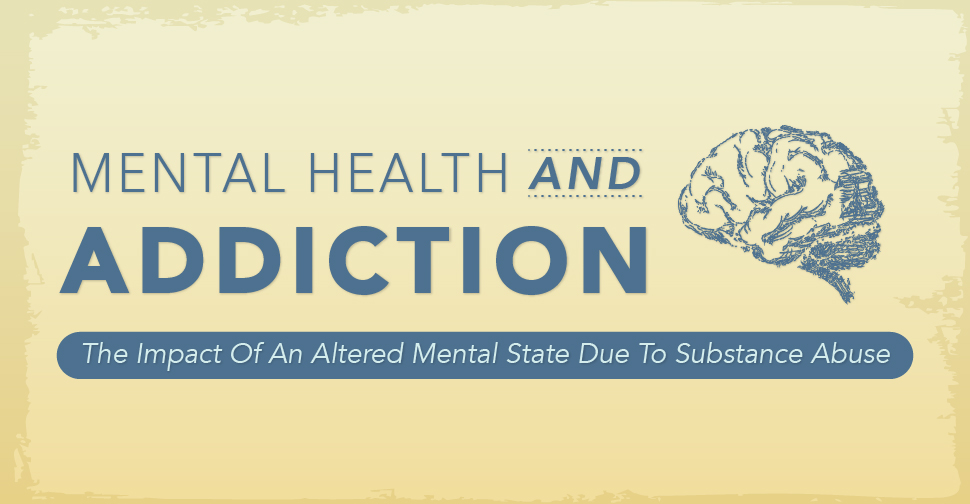
Mental health can be greatly improved or worsened by the lifestyle choices of an individual. With great care, even those with pre-existing mental health disorders can see improved mental health and overall quality of life. Abuse of drugs and alcohol have the opposite effect: they worsen pre-existing mental health disorders and cause a great disturbance to an otherwise healthy mind.
The Impact Of An Altered Mental State Due To Substance Abuse
Substance abuse can have lasting effects on brain chemistry. Over time, drugs and alcohol can create an altered state which can be perceived as “normal” or baseline. When drug or alcohol use is ceased, the baseline is skewed which often sends the brain into the opposite of the perceived normal.
For instance, if someone is addicted to heroin, the “baseline” will be the euphoria it causes. When the drug is removed from the equation, those experiencing addiction may feel acute depression, anxiety, and despair. Aside from the expected withdrawal symptoms from detoxification, these mental health factors may impact recovery.
Preexisting Mental Illness
Many pre-existing mental illnesses can be made worse by substance abuse. This can generate a cycle of self-medication and further agitation of pre-existing disorders. Drug and alcohol use can also interfere with prescribed medication used to treat mental illness by lowering its effectiveness or even adverse reactions when taken together. Certain substances can impact pre-existing mental disorders in various ways. For instance:
- Stimulants, such as amphetamines, cocaine, and ecstasy can agitate preexisting anxiety.
- Stimulants can also cause a backfire reaction when taken with depression, as the contrast from normal state to “high” is so extreme.
- Depressants (slows messages to the brain), such as alcohol, marijuana, and heroin can disturb preexisting depression when used.
- Depressants also trigger extreme anxiety, as the calming sensation can change the relative sensations in normal state.
- Hallucinogenic effects of many drugs can seriously affect those suffering from schizophrenia, bipolar, and other psychotic disorders.
Many substances can trigger bipolar mania, severe depression, and extreme anxiety in those suffering from mental illness. The withdrawal period when the substance is unobtainable can also become more difficult to manage with pre-existing mental disorders.
When undergoing recovery, it is especially important for those with mental disorders to have psychiatric monitoring to ease the detox and rehabilitation period.
Mental Health May Influence Addictive Behavior
Those suffering from mental health disorders may be more susceptible to addiction. In an effort to self-medicate mental health disorders some reach out to drugs and alcohol for relief. Some mental health disorders may leave sufferers predisposed due to decreased impulse control and impaired decision making. While these decisions may be made in desperation, new problems are often introduced as addiction takes hold.
Identifying Addiction With Mental Health Disorders
Addiction can be especially dangerous for those struggling with mental health disorders. Recognizing behavioral changes early on can help loved ones intervene if substance abuse is suspected. To help it is important to know what to look for. Some of the key changes in those struggling with addiction include:
- Sudden money trouble – Many drugs come with a hefty price tag, and maintaining an addiction can prove very expensive, often leading to financial distress.
- Significant mood swings, uncharacteristic to those experienced with mental illness. Deeper depression, thoughts of suicide, agitation, elevated anxiety, and other extreme behavior may result.
- Disappearing for extended periods of time, or disconnection with family, friends, and community.
- Increased emotional sensitivity, or defensive behavior.
- Declining health, or significant increase or decrease in weight.
- Confusion, delusions, or hallucinations.
It may be difficult for loved ones to identify addiction in those struggling with mental health disorders as behavioral changes may be commonplace with some illnesses. If something seems “off” it is beneficial to observe and react accordingly. Outside help is often required and especially important in those struggling with mental health disorders.
Addiction Impacts Mental Health
Nearly all substances will interfere with mental health either directly or indirectly. Addiction and mental health problems may render those struggling with extreme hardship. Family and friends may observe these changes and wonder how to help their loved one get relief
Ultimately, rehabilitation is the only method to improve mental health when addiction is apparent. Seeking guidance with intervention may be the most important step in aiding your loved one to a healthier life.
We Can Help
 If you, or a loved one is struggling with mental illness and addiction, finding relief may prove challenging. The caring staff at DrugRehab.org are here to help you find answers you need. We can help with resources, and guide you through the rehabilitation process. Contact us today.
If you, or a loved one is struggling with mental illness and addiction, finding relief may prove challenging. The caring staff at DrugRehab.org are here to help you find answers you need. We can help with resources, and guide you through the rehabilitation process. Contact us today.

